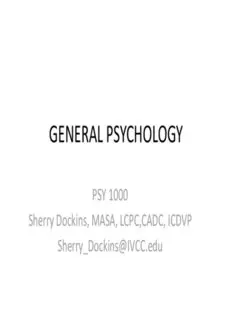
GENERAL PSYCHOLOGY PDF
Preview GENERAL PSYCHOLOGY
GENERAL PSYCHOLOGY PSY 1000 Sherry Dockins, MASA, LCPC,CADC, ICDVP [email protected] Introduction • What is psychology? • Why are you taking this course? • What do you expect to learn? What to expect • PowerPoint • Lecture • Small group • Large group discussion • In class activities • Out of class activities • Research paper • Exams Chapter 1 The Science of Psychology What is Psychology? • The scientific study of behavior and mental processes. – Physical state – Mental state – Environment • Behavior = outward or avert actions and reactions – Talking, facial expressions and movement • Mental Process = internal, covert activity – Thinking, feeling and remembering Psychology’s Goals • Description – What is happening? – Student who’s grades are slipping • Explanation – Why is it happening? – Theory – Testing – dyslexia • Prediction – When will it happen again? – Probably throughout academic experience • Control – How can it be changed? – Intervene – Learning strategies The History of Psychology • Wilhelm Wundt (1832-1920) Germany – Father of Psychology – 1st in movement to make psychology a science – 1st true experimental lab in psychology Structuralist - structure or basic elements of the mind Objective introspection – Examining and measuring one’s own thoughts and mental activities • Trained volunteers to observe, analyze and describe their own sensations, mental images and emotional reactions. • Train 10,00 observations; 20 mins to report 1.5 second experiment • Goal to break down behavior in to basic elements…H 0 2 – Eventually rejected as too subjective The history of Psychology • Structuralism (USA) – E.B. Titchener (1867 – 1927) – Student of Wilhelm Wundt – Analyze sensations, images and feelings into basic elements • Eventually Discarded • Functionalism – William James (1842 – 1910) – Function or purpose of behavior • not analysis or description – How do specific behaviors & mental processes help ADAPT to environment? • No longer a major perspective The history of Psychology • Gestalt Psychology – “The whole is greater than the sum of the parts” – Max Wertheimer – Gestalt = “an organized whole” or “configuration” – People seek our patterns to make sense of things • Gestalt Psychology • Focus on perceptions and sensations – particularly the perception of patterns and whole figures The History of Psychology • Psychoanalysis – Sigmund Freud (1856-1939) – Neurologist Theory of personality - a type of psychotherapy that emphasizes unconscious or repressed motives and conflicts. – Depression, anxiety & obsession had mental not physical causes – This distress due to conflict and emotional traumas in childhood – Conscious awareness “tip of the mental iceberg” – “interpretation of dreams’ – Well known……profound influence …. • His theory used in modified form
